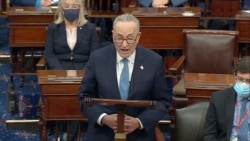Capping nearly a half-century in politics, Democratic Senator Chuck Schumer is on the verge of taking control as majority leader of a closely divided Senate, placing him at the center of the legislative battles to come when President-elect Joe Biden is inaugurated January 20.
Schumer, 70, the first New Yorker and the first Jew to hold the position of Senate Majority Leader, will succeed Republican Majority Leader Mitch McConnell of Kentucky at a perilous moment: The country is gripped by the deadly COVID-19 epidemic, the economy is in tatters, and the nation is reeling from last Wednesday’s rioting at the U.S. Capitol by a mob of President Donald Trump’s supporters.
Indeed, Schumer likely will assume his new leadership role in the midst of another contentious fight to eject Trump from the White House, even as the Republican president’s term nears its end.
With a new Senate controlled by the Democrats unlikely to act on an article of impeachment until after Democratic President-elect Joe Biden is sworn in on January 20, Schumer’s first order of business will be to devise a strategy to simultaneously confirm Biden’s Cabinet and pass critical policy initiatives while conducting an impeachment trial of Trump.
In a letter to Senate colleagues this week, Schumer vowed that impeachment won’t interfere with the Democratic Party agenda, which includes passage of a coronavirus pandemic stimulus package providing $2,000 individual payments and state and local assistance.
He also listed other goals, such as “bold legislation to defeat the climate crisis” and efforts to fix the health care and childcare systems, according to the Associated Press.
Biden has encouraged Schumer and other Democratic leaders to pursue a “bifurcated” approach by dividing legislative days between an impeachment trial and getting his nominees for top government posts confirmed by the Senate.
Although Trump would be out of office by the time the Senate is able to act on the impeachment charge, Schumer, House Speaker Nancy Pelosi and other Democrats note that Trump would be barred from running for president again in 2024 if he is convicted of inciting violence against the government.
Timing of Senate handover uncertain
It took an improbable Democratic sweep of two Senate seats in Georgia runoff elections Jan. 5 to shift control of the Senate from the Republicans to the Democrats — and elevate Schumer from minority leader to the top leadership job.
It is currently impossible to pinpoint the specific day on which Schumer will take control of the Senate, because of how closely divided the body is and because of some peculiarities of election law.
The chamber will ultimately be split between 50 Democrats and 50 Republicans, with Vice President-elect Kamala Harris casting tie-breaking votes in favor of Democrats. However, before that can happen a replacement for Harris, who is currently a senator, and the two senators-elect from Georgia, who won runoff elections last week, must all be seated.
Harris’s appointed replacement, California Secretary of State Alex Padilla, can be seated as soon as Harris is inaugurated. But Raphael Warnock and Jon Ossoff, the two incoming senators from Georgia, could have to wait until as late as January 22 to take their positions, depending on when state officials certify their elections.
A history of pragmatism
Although Schumer’s position as his party’s leader inevitably places him at a political flashpoint, his history in state politics and the U.S. Congress over the past 45 years has been marked by a broad streak of pragmatism and a willingness to make deals across the aisle.
In particular, Schumer has served as a bridge between the parties on issues related to the financial services industry, one of the most important sectors, if not the most important, in his state’s economy. He is often criticized by members of his own party for being too solicitous of Wall Street.
He also sought to strike bipartisan deals on contentious issues. He was a member of the “Gang of 8” — a group of senators that in 2013 led a successful bipartisan effort to pass a comprehensive immigration reform law in the Senate. The legislation ultimately died in the House.
Over the years, Schumer has been a reliable supporter of many policy aims associated with the Democratic Party. In particular, he has been a strong advocate for gun control, expansion of access to health insurance, and the right of women to choose to have abortions.
However, he has also been willing to break from his party. He has, at times, resisted efforts to raise taxes on people earning considerably more money than average Americans, pointing out that in high-cost areas like New York, income levels that would be considered very high elsewhere are necessary to maintain a middle-class lifestyle.
Schumer’s strong support for Israel has also left him at odds with his party on occasion. He voted against the Iran nuclear deal negotiated by the Obama administration in 2015, and spoke in favor of President Trump’s controversial decision to move the United States’ embassy in Israel to the contested city of Jerusalem.
A skilled political campaigner and organizer, Schumer has never lost an election in his career. He also headed the Democratic Senatorial Campaign Committee, leading the party in retaking control of the Senate in 2006 by ousting half a dozen Republican incumbents. In the next election, still under Schumer’s leadership, the DSCC helped the party gain an additional eight seats.
His skills as a politician will be fully tested in the tightly controlled Senate, where the “filibuster” rule can make it difficult to pass any legislation with fewer than 60 votes, and where even measures that can be passed with a simple majority will have to please the most conservative Democrats in the body.
“Schumer is constrained both by the filibuster and also the preferences of his least-liberal members,” said Kyle Kondik of the University of Virginia Center for Politics. “That list starts with Sen. Joe Manchin of West Virginia.
“It seems like the $2,000 stimulus checks will be a very early agenda item for the new Congress. Can Schumer structure it in such a way that he can secure the vote of Manchin, who has said that he doesn’t view the checks as a top priority? Or, if he loses Manchin, could he find Republican votes? How this unfolds is an interesting early test for Schumer as majority leader.”
A son of Brooklyn
Schumer’s elevation to one of the most powerful positions in the country comes as the culmination of a political career that has spanned nearly five decades. Beginning as a state assemblyman in New York in 1975, Schumer worked his way ever upward, spending eighteen years as a member of the House of Representatives before being elected to the Senate for the first time in 1998.
Born in Brooklyn, New York in 1950, Schumer still lives in the borough’s Park Slope neighborhood with his wife of more than 40 years, Iris Weinshall. They have two adult daughters. Schumer attended Harvard College and Harvard Law School, passing the bar in the state of New York in 1975, though he never practiced law.
Schumer is the second cousin of comedian and actress Amy Schumer.
Schumer is often the subject of jokes on Capitol Hill because of his sharp elbows and fondness for publicity. Former Senate Majority Leader and Republican presidential nominee Bob Dole once said, "the most dangerous place in Washington is between Charles Schumer and a television camera."








